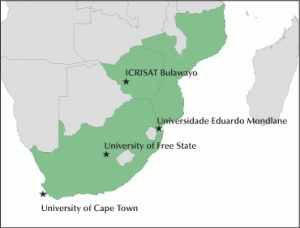This project explored opportunities to reduce risk and increase resilience in Southern Africa using an integrated multi-modeling approach.
The overall aim of this project was to identify pathways to improve food security in southern Africa’s mixed crop livestock systems and develop adaptive management strategies to reduce climate induced risks and to increase systems resilience.
Teams of crop, economic, and climate scientists in southeastern Africa explored opportunities to reduce risk and increase resilience in southern Africa using an integrated multi-modeling approach. The project characterised selected mixed farming systems in southern Africa in terms of biophysical and socio-economic characteristics, developed and evaluated crop-livestock management and climate change adaptation strategies that increase food production, agro-diversity and economic returns, and explored the interactions and synergies of increased diversity and integration and their contribution to reduce risk and increase system resilience
The project has provided understanding of challenges and opportunities in the current mixed farming systems of southern Africa for better targeting of interventions to increase systems resilience and reduce climate-induced risk. It also improved the understanding of the interactions and synergies of production system components.
CLIP-1 represents the first phase of the work and has been followed by CLIP-2, which commenced in 2015.
Time frames: 2 year project, May 2012 to February 2014
Funder: The Agricultural Model Inter-comparison and improvement Project (AgMIP)
Partners: Led by the International Crops Research Institute for the Semi-Arid Tropics (ICRISAT)
For further details: Contact Dr Olivier Crespo

